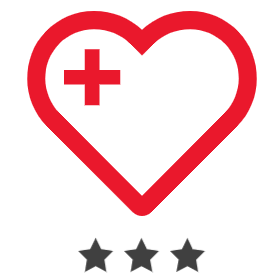How to Survive 1st Year of Medical School?
Stepping into the world of medical school is a thrilling yet formidable journey. At the core of your success lies effective time management, ensuring a harmonious life alongside your demanding studies. Medical education differs significantly from your prior academic experiences, requiring you to hone new strategies for successful learning. Here, we offer essential insights to help you kickstart your medical school journey on the right foot.
1. Prioritize Your Attendance: Diligently attend classes and be punctual. This not only aids in comprehending the syllabus but also allows you to predict potential exam questions based on the instructor’s teaching style.
2. Stay Well-Informed: Dedicate time to stay updated with the ever-evolving medical world by regularly perusing medical literature and resources. This will enhance your overall understanding of the field. Additionally, attending medical conferences and webinars can also provide valuable insights and knowledge about the latest advancements in the field. Another helpful resource is to download 9th edition Moore’s Clinically Oriented Anatomy PDF, which provides in-depth information about human anatomy and its clinical applications. By staying well-informed, you can ensure that you are providing the best possible care for your patients and staying at the forefront of medical knowledge.
3. Maintain Work-Life Balance: Remember to indulge in your hobbies, engage in physical activities, watch movies, and spend quality time with friends to refresh your mind and alleviate stress.
4. Uphold Professional Conduct: Your interactions with teachers, staff, and fellow students are as vital as your academic performance. Your behavior throughout the year can have a direct impact on your exam results.
5. Dodge Distractions: Steer clear of activities that squander your precious time and divert your focus from your educational objectives.
6. Foster a Keen Learning Attitude: Understand that medical education extends beyond the prescribed syllabus. Stay curious and strive for continuous learning.
7. Embrace Internal Evaluation: Regularly assess your progress and understanding of the subject matter, particularly at the end of each unit or “stage.” These self-assessments are invaluable for your growth.
Read More: All MBBS Books PDF 2024 FREE Download (First year to Final year)
Now, let’s dive into some practical study tips that can help you thrive in the demanding environment of medical college:
Effective Study Techniques:
- Commence Early: Start studying from day one and allocate 2-3 hours daily for independent study apart from attending lectures.
- Optimal Study Environment: Find the study environment that suits you best, whether it’s in silence, with background music, in a group, or alone.
- Weekly Checklist: Create a weekly checklist with daily targets to keep your studies organized.
- Peer Learning: Discuss topics with classmates, as peer teaching and learning can be highly beneficial.
- Conceptual Understanding: Focus on understanding the concepts rather than rote memorization.
- Regular Revision: Review your notes regularly to convert short-term knowledge into long-term memory.
- Active Learning: Use active learning strategies like highlighting key text and jotting down additional points.
- Short Study Sessions: Study in 40-minute intervals with short breaks in between to maintain concentration and productivity.
- Eye Breaks: Follow the 20-20-20 rule to prevent eye strain by looking at a distance for 20 seconds every 20 minutes.
- Adequate Sleep: Ensure you get enough sleep to maintain your focus and energy levels.
Preparing for Exams:
- Prioritize Important Topics: Focus on essential topics with a view to the upcoming exams.
- Remain Calm: Avoid panicking and maintain your confidence, both in your knowledge and in your exam-taking abilities.
- Practice Questions: Test your understanding by practicing questions regularly; this is a more effective way of reinforcing your knowledge than repetitive reading.
Recommended Books for 1st Year MBBS:
Anatomy:
- Gray’s Anatomy by Prof. Susan Standring
- Clinical Oriented Anatomy by KLM
- B.D. Chaurasia (for osteology)
- B.D. Chaurasia Handbook for General Anatomy
- The Developing Human: Clinically Oriented Embryology by KLM
- Langman Embryology
- Medical Histology by Prof. Laiq Hussain
Physiology:
- Textbook of Physiology by Guyton and Hall (considered sufficient for Physiology)
Biochemistry:
- Lippincott Illustrated Review of Biochemistry
- Satyanarayana Biochemistry
Exam Day Tactics:
- Stay calm and collected.
- Carefully read and follow instructions.
- Identify keywords in questions that provide context.
- Attempt all questions, even if you are uncertain; come back to them later.
- Manage your time effectively during the exam.
- Focus on clear and concise answers.
- Stay away from distractions like laptops and social media during the exam.
Viva and Practical Performance:
- Prepare for viva exams differently from written exams.
- Stay composed and confident.
- Listen carefully to the examiner’s questions.
- Start with basic questions and progressively move to more complex ones.
- Ensure you understand the key elements of each question.
- Tailor your responses to the examiner’s expectations.
- Don’t over-elaborate; provide concise and relevant answers.
Conclusion:
As you embark on this noble profession, remember that your demeanor, both inside and outside the classroom, reflects your dedication to medicine. Approach your education with passion, stay focused, and always strive to be the best version of yourself.
Best of luck on your medical school journey! 📚💉👩⚕️👨⚕️


